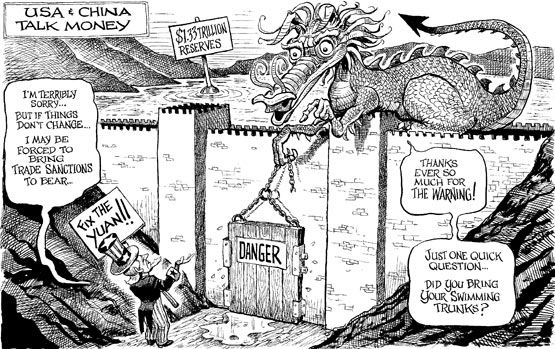Italian police arrest 2 Japanese smuggling $134 billion in bonds into Switzerland
This news is bound to cause further flutter among dollar investors. Could it be possible that Japan is trying to dump 20% of it's US holdings onto the black market for fear they will be worth very little soon?June 17 (Bloomberg) -- It’s a plot better suited for a John Le Carre novel.
Two Japanese men are detained in Italy after allegedly attempting to take $134 billion worth of U.S. bonds over the border into Switzerland. Details are maddeningly sketchy, so naturally the global rumor mill is kicking into high gear.
Are these would-be smugglers agents of Kim Jong Il stashing North Korea’s cash in a Swiss vault? Bagmen for Nigerian Internet scammers? Was the money meant for terrorists looking to buy nuclear warheads? Is Japan dumping its dollars secretly? Are the bonds real or counterfeit?
The implications of the securities being legitimate would be bigger than investors may realize. At a minimum, it would suggest that the U.S. risks losing control over its monetary supply on a massive scale. The trillions of dollars of debt the U.S. will issue in the next couple of years needs buyers. Attracting them will require making sure that existing ones aren’t losing faith in the U.S.’s ability to control the dollar.
The dollar is, for better or worse, the core of our world economy and it’s best to keep it stable. News that’s more fitting for international spy novels than the financial pages won’t help that effort. It is incumbent upon the U.S. Treasury to get to the bottom of this tale and keep markets informed.
GDP Carriers
Think about it: These two guys were carrying the gross domestic product of New Zealand or enough for three Beijing Olympics. If economies were for sale, the men could buy Slovakia and Croatia and have plenty left over for Mongolia or Cambodia. Yes, they could have built vacation homes amidst Genghis Khan’s Gobi Desert or the famed Temples of Angkor. Bernard Madoff who? These men carrying bonds concealed in the bottom of their luggage also would be the fourth-largest U.S. creditors. It makes you wonder if some of the time Treasury Secretary Timothy Geithner spends keeping the Chinese and Japanese invested in dollars should be devoted to well-financed men crossing the Italian-Swiss border.
This tale has gotten little attention in markets, perhaps because of the absurdity of our times. The last year has been a decidedly disorienting one for capitalists who once knew up from down, red from black and risk from reward. It almost fits with the surreal nature of today that a couple of travelers have more U.S. debt than Brazil in a suitcase and, well, that’s life.
Clancy Bestseller
You can almost picture Tom Clancy sitting in his study thinking: “Damn! Why didn’t I think of this yarn and novelize it years ago?” He could have sprinkled in a Chinese angle, a pinch of Russian intrigue, a dose of Pyongyang and a bit of Taiwan-Strait tension into the mix. Presto, a sure bestseller.
Daniel Craig may be thinking this is a great story on which to base the next James Bond flick. Perhaps Don Johnson could buy the rights to this tale. In 2002, the “Miami Vice” star was stopped by German customs officers as he was traveling in a car carrying credit notes and other securities worth as much as $8 billion. Now he could claim it was all, uh, research.
When I first heard of the $134 billion story, I was tempted to glance at my calendar to make sure it didn’t read April 1.
Let’s assume for a moment that these U.S. bonds are real. That would make a mockery of Japanese Finance Minister Kaoru Yosano’s “absolutely unshakable” confidence in the credibility of the U.S. dollar. Yosano would have some explaining to do about Japan’s $686 billion of U.S. debt if more of these suitcase capers come to light.
‘Kennedy Bonds’
Counterfeit $100 bills are one thing; two guys with undeclared bonds including 249 certificates worth $500 million and 10 “Kennedy bonds” of $1 billion each is quite another.
The bust could be a boon for Italy. If the securities are found to be genuine, the smugglers could be fined 40 percent of the total value for attempting to take them out of the country. Not a bad payday for a government grappling with a widening budget deficit and rebuilding the town of L’Aquila, which was destroyed by an earthquake in April.
It would be terrible news for the White House. Other than the U.S., China or Japan, no other nation could theoretically move those amounts. In the absence of clear explanations coming from the Treasury, conspiracy theories are filling the void.
On his blog, the Market Ticker, Karl Denninger wonders if the Treasury “has been surreptitiously issuing bonds to, say, Japan, as a means of financing deficits that someone didn’t want reported over the last, oh, say 10 or 20 years.” Adds Denninger: “Let’s hope we get those answers, and this isn’t one of those ‘funny things’ that just disappears into the night.”
This is still a story with far more questions than answers. It’s odd, though, that it’s not garnering more media attention. Interest is likely to grow. The last thing Geithner and Federal Reserve Chairman Ben Bernanke need right now is tens of billions more of U.S. bonds -- or even high-quality fake ones -- suddenly popping up around the globe.
Another article provides more food for thought: Strange Inconsistencies in the $134.5 Billion Bearer Bond Mystery
Admins, please feel free to cross-post in other relevant threads.





